Memory is essential in our daily lives. It helps us learn, interact, and adapt. There are different types of memory, and understanding them can help us see how our mind works. Let's explore these different forms and why they are important.
I. Understanding Memory Types
Memory is how our brain stores and retrieves information. There are three main types: sensory memory, short-term memory, and long-term memory.
Sensory Memory
Sensory memory is the immediate, very brief recording of sensory information. It involves our senses, like sight and sound.
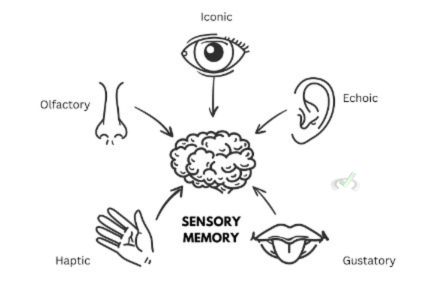
For instance, when you see a flash of lightning, your visual sensory memory holds that image for a split second. There are two types of sensory memory:
- Iconic Memory: This is visual sensory memory. It holds images for a brief moment.
- Echoic Memory: This is auditory sensory memory. It holds sounds for a few seconds longer.
Short-Term Memory
Short-term memory, also known as working memory, holds information temporarily. It's what you use to remember a phone number long enough to dial it.
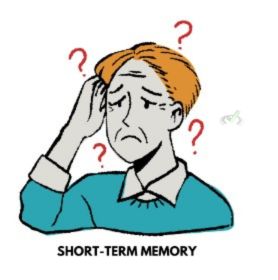
This type of memory can hold about 7 items at once and lasts for about 20-30 seconds. Working memory has different parts:
- Phonological Loop: This part deals with spoken and written information.
- Visuospatial Sketchpad: This part helps you remember visual information, like shapes and locations.
- Central Executive: This part directs attention and manages the other parts of working memory.
Long-Term Memory
Long-term memory stores information for a long time. This can include memories of your first day at school or facts like the capital of your country.
This type of memory has a large capacity and can last from a few days to many years. Long-term memory is divided into two main types: explicit and implicit memory.
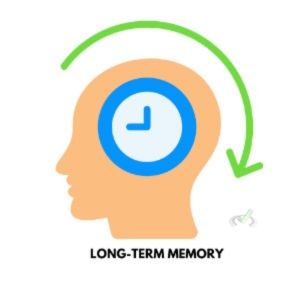
II. Types of Long-Term Memory
Long-term memory can be divided into explicit memory and implicit memory.
Explicit Memory
Explicit memory involves the conscious recall of facts and events. It is also known as declarative memory because you can "declare" or speak about what you remember. There are two types of explicit memory:
- Episodic Memory: This is the memory of personal experiences and events, such as your last birthday party.
- Semantic Memory: This is the memory of facts and general knowledge. For instance, knowing the name of the current president.
Implicit Memory
Implicit memory is unconscious and involves skills and conditioned responses. You do not have to think about it to use it. Implicit memory includes:
- Procedural Memory: This involves skills and how to perform tasks, like riding a bike or typing on a keyboard.
- Classical Conditioning: This type of learning involves associating a stimulus with a response. For instance, you may feel hungry when you hear a bell if it has been used to signal meal times.
- Priming: This is when exposure to one stimulus influences the response to another. For example, if you see the word "yellow," you may be quicker to recognize the word "banana."
III. Factors Affecting Memory
Several factors can affect how well we remember things.
Attention
Paying attention is crucial for storing information in memory. If you are not focused, you are less likely to remember.
Selective attention means focusing on certain information. Meanwhile, ignoring others helps better encode memories.
Repetition
Repeating information helps move it from short-term memory to long-term memory. For example, repeating a phone number several times can help you remember it later.
Emotion
Emotions can enhance memory. Emotionally charged events, like your graduation day, are often remembered better. This happens because the amygdala, a part of the brain involved in emotions, helps strengthen the memory.
Context
The setting or context where you learn something can affect memory. You are more likely to recall information in the same place where you learned it. This is known as context-dependent memory.
Similarly, if you learn something in a particular emotional state, you are more likely to remember it if you are in the same state again. This is called state-dependent learning.
IV. Theories of Memory
There are several theories about how memory works.
The Multi-Store Model
This theory suggests that memory consists of three stores. These are sensory memory, short-term memory, and long-term memory. Information moves from one store to another through processes like attention and rehearsal (practicing or repeating the information).
The Working Memory Model
This model focuses on short-term memory and how it actively processes information. It includes components like the central executive, which directs attention, and the phonological loop, which deals with verbal information.
Levels of Processing Model
This theory indicates that the depth of processing affects how well we remember information. Deeper processing, like thinking about the meaning of a word, leads to better memory than shallow processing, like focusing on how a word looks or sounds.
V. Effects of Memory Types
Understanding the various types of memory helps us see how we learn and function.
Positive Effects
- Academic Success: Knowing how different memories work can help us use study strategies effectively. For instance, using spaced repetition can improve retention.
- Skill Development: Understanding procedural memory can help improve skills like playing an instrument or sports.
- Personal Growth: Episodic memory allows us to reflect on past experiences, aiding in personal growth and learning from our past.
Negative Effects
- Forgetfulness: Failure to move information from short-term to long-term memory leads to forgetfulness. This can happen due to reduced attention or poor encoding.
- Overload: Storing too much information at once can overwhelm short-term memory, leading to confusion or difficulty recalling information.
- Emotional Bias: Strong emotions can skew our memories, making them inaccurate. This can lead to memory distortions, where we remember things differently from how they happened.
VI. Bridge/Overlap
The study of memory intersects with many other areas in psychology and beyond.
Cognitive Psychology
Understanding memory is central to cognitive psychology. This explores how we think, perceive, and remember information.
Educational Psychology
Insights into memory can improve teaching methods and learning strategies. Techniques like spaced repetition (reviewing information at increasing intervals) and retrieval practice (testing yourself on information) can enhance learning and retention.
Neuroscience
Memory is closely related to the study of the brain and nervous system. Neuroscience explores the different parts of the brain.
For example, the hippocampus and amygdala contributes to memory processes. The hippocampus is crucial for forming new explicit memories. Meanwhile, the amygdala is involved in emotional memories.
Mental Health
Memory issues can be related to mental health conditions like depression, anxiety, and PTSD (Post-Traumatic Stress Disorder). Understanding how memory works can help develop treatments and strategies to manage these conditions.
VII. Wrap Up/Key Terms
Let's summarize the key points:
- Sensory Memory: Immediate, brief recording of sensory information.
- Short-Term Memory: Holds information temporarily for about 20-30 seconds.
- Long-Term Memory: Stores information for a long time.
- Explicit Memory: Conscious recall of facts and events, including episodic and semantic memory.
- Implicit Memory: Unconscious memory includes procedural memory, classical conditioning, and priming.
- Attention: Focusing on information to remember it better.
- Repetition: Repeating information to move it from short-term to long-term memory.
- Emotion and Context: Can enhance or affect memory recall.
VIII. Practice
Test your understanding with these questions:
Sample Practice Question 1
What type of memory involves skills and tasks?
A. Sensory Memory
B. Short-Term Memory
C. Procedural Memory
D. Episodic Memory
Ans. C
Procedural memory involves knowing how to perform tasks and skills, like riding a bike.
Sample Practice Question 2
Which factor does NOT typically enhance memory?
A. Attention
B. Repetition
C. Emotion
D. Boredom
Ans. D
Boredom does not typically enhance memory. Factors like attention, repetition, and emotion improve memory recall.

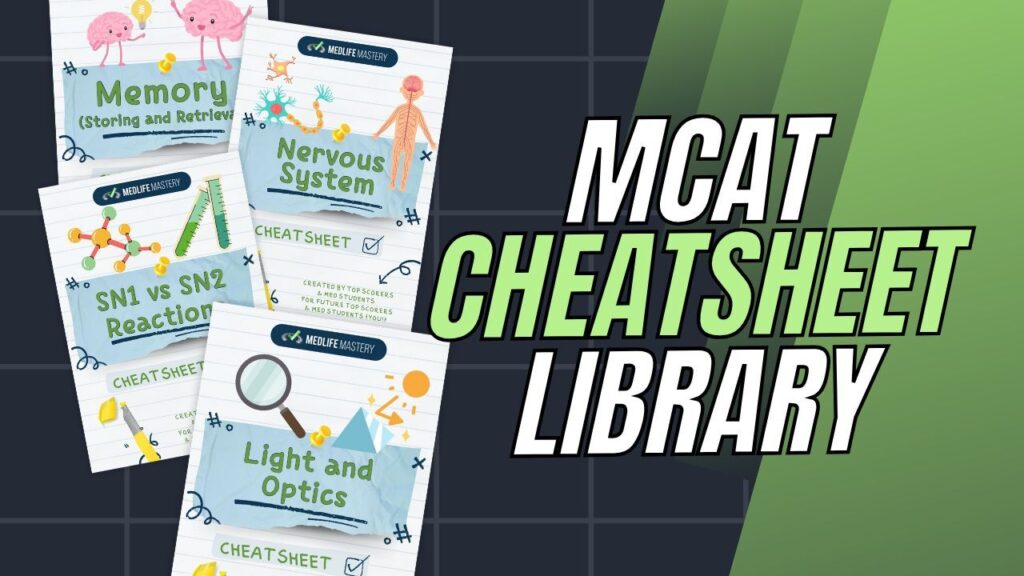



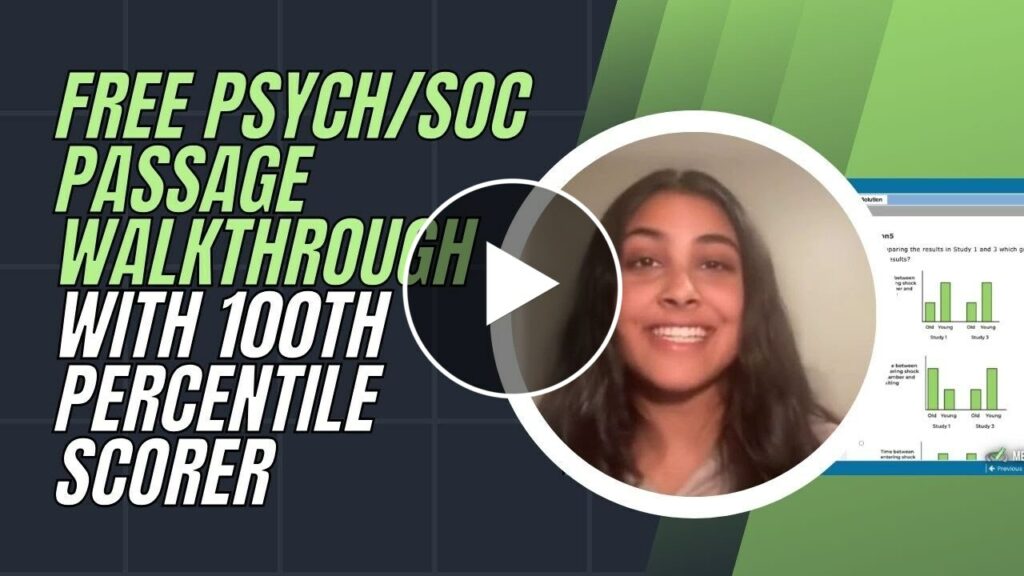

 To help you achieve your goal MCAT score, we take turns hosting these
To help you achieve your goal MCAT score, we take turns hosting these 
